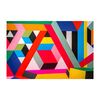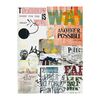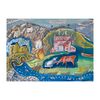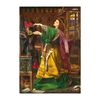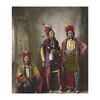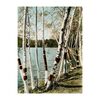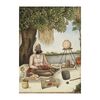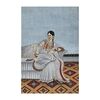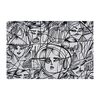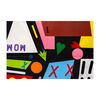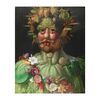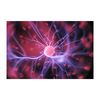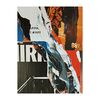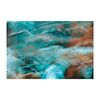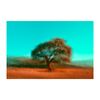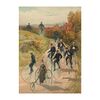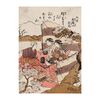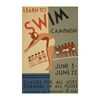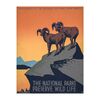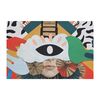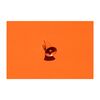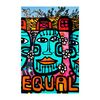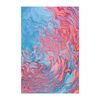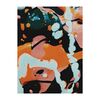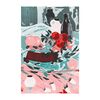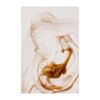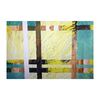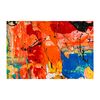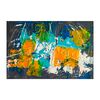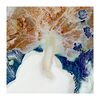Cynefin® training data-sets are sets of items that can be used in preliminary training sessions, in preparation for methods to be subsequently used.
A typical use is within the Butterfly stamping method.
Artifacts, typically "hexies" and sticky notes can be prepared in advance of training sessions, based on available data-sets. For that purpose, it is recommended that data-sets are stored in simple tables, so as to facilitate artifact production.
Data-set requirements
Data-set minimum requirements are:
- 20 items (up to 60)
- Items should be relevant to the Cynefin domains (most data sets are used for contextualization methods)
- Clear exemplars of all domains should exist in the set (see below)
- A certain degree of interpretation ambiguity is desirable
- A certain level of contextual abstraction is desirable, i.e. topics unrelated with specific problems that will be part of subsequent discussions
- Avoid culturally-sensitive, political, religious, or otherwise potentially controversial topics
- Avoid the use of intellectual property, trade marks, etc.
- A short description of each item
Exemplars
For data sets to be used in contextualisation, they require a set of exemplar items for each domain. Exemplar sets may be created by working with experts in a field to identify or create exemplar items for a common description of each Cynefin domain, including the liminal zones. The resulting items are then randomised and used by groups in activities.
Exemplar Data Set template
| Domain definition |
Category 1 |
Category 2 |
Category 3
|
| Ordered: Clear defined rules and processes where compliance can be measured and the ability to apply the process trained |
Example |
Example |
Example
|
| Complex: Ambiguous, multiple possibilities, deeply entangled with high levels of ambiguity, multiple possible pathways |
Example |
Example |
Example
|
| Chaotic: Seemly random, temporary but scary events or activities where there is no pattern and more or less anything might work |
Example |
Example |
Example
|
| Aporetic: A state of tension, difficult to resolve or paradoxical in nature, unanswerable questions |
Example |
Example |
Example
|
| Complex to Order liminal: Certainty about the future path is starting to emerge but there are still some ambiguities and unresolved conflicts |
Example |
Example |
Example
|
| Complex to Chaotic liminal: We may be missing key hypotheses or weak signals - the 17% 'seeing gorillas' issue |
Example |
Example |
Example
|
| Complicated liminal: Conflicting bodies of expertise. all arguing for decision maker attention, all evidence based but in conflict |
Example |
Example |
Example
|
Data-set description
Each data-set is described by:
- A "Data-set status" table, the progressive values of which are:
- Idea - Name, brief explanation of concept, and a few sample items
- Draft partial - Incomplete descriptions or insufficient number of items
- Draft complete - First test use of data-set done without major issues detected
- Published - Full data-set available on Wiki for use in a variety of contexts
- Used - Dataset successfully used in live contexts
- A "Data-set description" table, containing the description of the data-set fields for that specific data-set
- A "DATA-SET" (sortable) table, containing the actual data
Data-set versioning is implicitly kept through the Wiki page history.
Data-set table column description
| Main label
|
Contains the name or a short descriptive phrase representing the data-set item, ideally in max. 50 characters
|
| Category
|
Optional. Qualifies the item according to a data-set-wide category, ideally in one or two words
|
| Sub-category
|
Optional. Qualifies the item according to a data-set-wide sub-category, ideally in one or two words
|
| Picture
|
Optional. Icon or stylized picture that visually describes or enriches the item. Ideally a small .svg file of aprox. 150x150px size and transparent background
|
Training data-set choice, filter, and customization...
Process for training data-set creation
Workflow
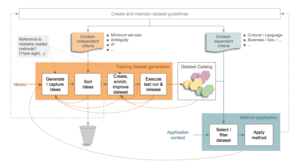
Method for data-set Creation
| STAGE INSTRUCTION |
COMMENTARY & TIPS
|
| Generate / capture ideas. Describe each idea of a new data-set with a few representative examples |
The output can be a text, a slide, a spreadsheet, or another graphical form, accompanied by a brief explanatory note. Idea generation can come from any source, including the subsequent steps of the process. The idea is reported in the Wiki, with the appropriate status and descriptions.
|
| Sort ideas. Check if the generated idea is compatible with the minimum data-set requirements. Discard the idea or move it on to the next step, according to the check result. |
Sorting criteria and guidelines are provided in the Wiki. Dataset sorting can also result in further idea generation. The sorted idea is reported in the Wiki, with the corresponding updated status and descriptions.
|
| Create, enrich, improve data-set. Produce a minimum data-set by adding enough items to the existing ones, and improve the existing ones as appropriate |
This stage can be repeated as many times as necessary. It can also result in further idea generation. The draft data-set is reported in the Wiki, with the added items, and the corresponding updated status and descriptions. The Triple eight method has been proposed as a way to perform this stage.
|
| Execute test run. Try the new data-set in a safe-to-fail context |
This stage can also result in further idea generation, or can determine the need for further improvement of the data-set. The status is updated on the Wiki.
|
| Release data-set. Publish the new data-set on the Wiki for future use |
The full data-set is now listed on the Wiki.
|
Sample data-sets
Butterfly stamping generic items (sample data-set)
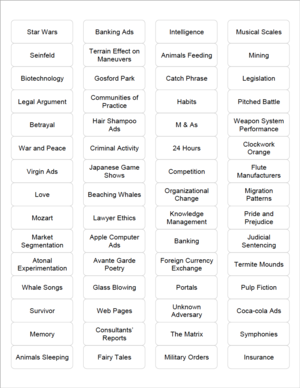
Butterfly Stamping Generic Items
Data-set status
| Idea
|
Draft partial
|
Draft complete
|
Published
|
Used
|
| X |
X |
X |
X |
X
|
Data-set description
| Main label
|
Generic item used in Butterfly stamping method
|
| Category
|
(Not used)
|
| Sub-category
|
(Not used)
|
| Picture
|
(Not used)
|
DATA-SET - Butterfly stamping generic items
| Main label
|
Category
|
Sub-category
|
Picture
|
| Star Wars
|
- |
- |
-
|
| Seinfeld
|
- |
- |
-
|
| Biotechnology
|
- |
- |
-
|
| Legal argument
|
- |
- |
-
|
| Betrayal
|
- |
- |
-
|
| War and Peace
|
- |
- |
-
|
| Virgin Ads
|
- |
- |
-
|
| Love
|
- |
- |
-
|
| Mozart
|
- |
- |
-
|
| Market segmentation
|
- |
- |
-
|
| Atonal experimentation
|
- |
- |
-
|
| Whale songs
|
- |
- |
-
|
| Survivor
|
- |
- |
-
|
| Memory
|
- |
- |
-
|
| Animals sleeping
|
- |
- |
-
|
| Banking ads
|
- |
- |
-
|
| Terrain effect on maneuvers
|
- |
- |
-
|
| Gosford park
|
- |
- |
-
|
| Communities of practice
|
- |
- |
-
|
| Hair shampoo ads
|
- |
- |
-
|
| Criminal activity
|
- |
- |
-
|
| Japanese game shows
|
- |
- |
-
|
| Beaching whales
|
- |
- |
-
|
| Lawyer ethics
|
- |
- |
-
|
| Apple computer ads
|
- |
- |
-
|
| Avant-garde poetry
|
- |
- |
-
|
| Glass blowing
|
- |
- |
-
|
| Web pages
|
- |
- |
-
|
| Consultants' reports
|
- |
- |
-
|
| Fairy tales
|
- |
- |
-
|
| Intelligence
|
- |
- |
-
|
| Animals feeding
|
- |
- |
-
|
| Catch phrase
|
- |
- |
-
|
| Habits
|
- |
- |
-
|
| M&A's
|
- |
- |
-
|
| 24 Hours
|
- |
- |
-
|
| Competition
|
- |
- |
-
|
| Organizational change
|
- |
- |
-
|
| Knowledge management
|
- |
- |
-
|
| Banking
|
- |
- |
-
|
| Foreign currency exchange
|
- |
- |
-
|
| Portals
|
- |
- |
-
|
| Unknown adversary
|
- |
- |
-
|
| The Matrix
|
- |
- |
-
|
| Military orders
|
- |
- |
-
|
| Musical scales
|
- |
- |
-
|
| Mining
|
- |
- |
-
|
| Legislation
|
- |
- |
-
|
| Pitched battle
|
- |
- |
-
|
| Weapon system performance
|
- |
- |
-
|
| Clockwork orange
|
- |
- |
-
|
| Flute manufacturers
|
- |
- |
-
|
| Migration patterns
|
- |
- |
-
|
| Pride and Prejudice
|
- |
- |
-
|
| Judicial sentences
|
- |
- |
-
|
| Termite mounds
|
- |
- |
-
|
| Pulp Fiction
|
- |
- |
-
|
| Coca-Cola ads
|
- |
- |
-
|
| Symphonies
|
- |
- |
-
|
| Insurance
|
- |
- |
-
|
Architectural landmarks (sample data-set)
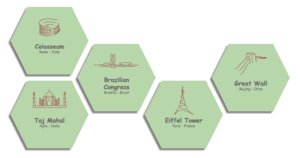
Data-set idea - Architectural Landmarks
Data-set status
| Idea
|
Draft partial
|
Draft complete
|
Published
|
Used
|
| X |
X |
X |
|
|
Data-set description
| Main label
|
The name of a well-known architectural landmark from any place in the world, chosen across all continents.
|
| Category
|
The name of the country in which the landmark is encountered
|
| Sub-category
|
The name of the city or place in which the landmark is encountered
|
| Picture
|
Optional. A vectorial icon or stylized picture that visually describes the item 150x150px size, with transparent background
|
DATA-SET - Architectural landmarks
| Main label
|
Category
|
Sub-category
|
Picture
|
| Colosseum
|
Italy |
Rome |
-
|
| Taj Mahal
|
India |
Agra |
-
|
| Brazilian Congress
|
Brazil |
Brasília |
-
|
| Eiffel Tower
|
France |
Paris |
-
|
| Great Wall
|
China |
Beijing |
-
|
| Egyptian pyramids
|
Giza |
Egypt |
-
|
| The Shard
|
United Kingdom |
London |
-
|
| Casa Rosada
|
Argentina |
Buenos Aires |
-
|
| Aachen Cathedral
|
Germany |
Aix-la-Chapelle |
-
|
| Opera House
|
Australia |
Sydney |
-
|
| Parthenon
|
Greece |
Athens |
-
|
| Machu Picchu
|
Peru |
Cuzco |
-
|
| Hagia Sophia
|
Turkey |
Istanbul |
-
|
| Angkor Wat
|
Cambodia |
Siem Reap |
-
|
| Borobudur
|
Indonesia |
Magelang, Java |
-
|
| Alhambra
|
Spain |
Granada |
-
|
| Forbidden City
|
China |
Beijing |
-
|
| Pisa Leaning Tower
|
Italy |
Pisa |
-
|
| Sagrada Familia
|
Spain |
Barcelona |
-
|
| Guggenheim Museum of Bilbao
|
Spain |
Bilbao |
-
|
| Guggenheim Museum of New York
|
United States |
New York |
-
|
| Pont du Gard
|
Nimes |
France |
-
|
| Hadrian's Wall
|
United Kingdom |
Northern England |
-
|
| Pirelli Tower
|
Italy |
Milan |
-
|
| Chartres Cathedral
|
France |
Chartres |
-
|
| Temple of Kukulcán
|
Mexico |
Chichén Itzá |
-
|
| Pisa Leaning Tower
|
Italy |
Pisa |
-
|
| Fallingwater
|
United States |
Mill Run, Pennsylvania |
-
|
| Tower Bridge
|
United Kingdom |
London |
-
|
| Hungarian Parliament
|
Hungary |
Budapest |
-
|
| Winter Palace
|
Russia |
Saint Petersburg |
-
|
| Petronas Towers
|
Malaysia |
Kuala Lumpur |
-
|
| Sankoré Madrasah
|
Mali |
Timbuktu |
-
|
Recipes and ingredients (sample data-set)
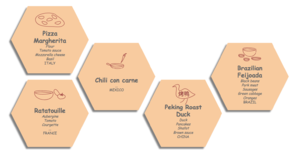
Data-set idea - Recipes and Ingredients
Data-set status
| Idea
|
Draft partial
|
Draft complete
|
Published
|
Used
|
| X |
|
|
|
|
Data-set description
| Main label
|
The name of a well-known recipe from one national or regional cuisine
|
| Category
|
The name of the country from which the recipe is
|
| Sub-category
|
A brief list of key ingredients
|
| Picture
|
Optional. A vectorial icon or stylized picture that visually describes the item 150x150px size, with transparent background
|
DATA-SET - Recipes and ingredients
| Main label
|
Category
|
Sub-category
|
Picture
|
| Pizza Margherita
|
Italy |
Wheat flour, tomato sauce, mozzarella cheese, basil |
-
|
| Chili con carne
|
Mexico |
Minced beef meat, chili peppers |
-
|
| Brazilian Feijoada
|
Brazil |
black beans, pork meat, "paio" sausages, green cabbage, oranges |
-
|
| Ratatouille
|
France |
Aubergine, tomato, courgette |
-
|
| Peking roast duck
|
China |
Duck, pancakes, shallot, brown sauce |
-
|
Travel destinations (sample data-set)
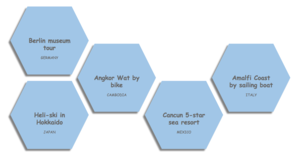
Data-set idea - Travel destinations
Data-set status
| Idea
|
Draft partial
|
Draft complete
|
Published
|
Used
|
| X |
|
|
|
|
Data-set description
| Main label
|
The name of a travel destination
|
| Category
|
The name of the country
|
| Sub-category
|
(Not used)
|
| Picture
|
Optional. A vectorial icon or stylized picture that visually describes the item 150x150px size, with transparent background
|
DATA-SET - Travel destinations
| Main label
|
Category
|
Sub-category
|
Picture
|
| Berlin museum tour
|
Germany |
- |
-
|
| Heli-ski in Hokkaido
|
Japan |
- |
-
|
| Angkor Wat by bike
|
Cambodia |
- |
-
|
| Cancun 5-star sea resort
|
Mexico |
- |
-
|
| Amalfi Coast by sailing boat
|
Italy |
- |
-
|
Corporate functions and departments (sample data-set)
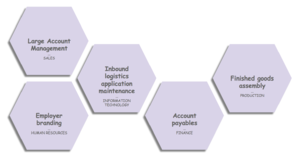
Data-set Idea - Corporate functions and departments
Data-set status
| Idea
|
Draft partial
|
Draft complete
|
Published
|
Used
|
| X |
|
|
|
|
Data-set description
| Main label
|
The name of a corporate department
|
| Category
|
The name of the main related corporate function
|
| Sub-category
|
(Not used)
|
| Picture
|
Optional. A vectorial icon or stylized picture that visually describes the item 150x150px size, with transparent background
|
DATA-SET - Corporate functions and departments
| Main label
|
Category
|
Sub-category
|
Picture
|
| Large account management
|
Sales |
- |
-
|
| Employer branding
|
Human resources |
- |
-
|
| Inbound logistics application maintenance
|
Information technology |
- |
-
|
| Account payables
|
Finance |
- |
-
|
| Finished goods assembly
|
Production |
- |
-
|
Product decisions sourced from practitioners across different orgs (sample data-set)
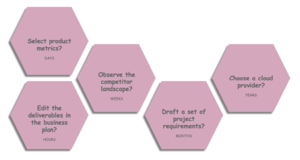
Data-set Idea - Product Decisions sourced from practitioners
Data-set status
| Idea
|
Draft partial
|
Draft complete
|
Published
|
Used
|
| X |
X |
|
|
|
Data-set description
| Main label
|
A product decision
|
| Category
|
Unsure ... could be about time scale?
|
| Sub-category
|
(Not used)
|
| Picture
|
Optional. A vectorial icon or stylized picture that visually describes the item 150x150px size, with transparent background
|
DATA-SET - Product decisions sourced from practitioners
| Main label
|
Category
|
Sub-category
|
Picture
|
| Challenge work that has recently shipped?
|
Days |
- |
-
|
| (Not) join a meeting?
|
Hours |
- |
-
|
| Draft a set of project requirements?
|
Months |
- |
-
|
| Translate research output into a visual?
|
Hours |
- |
-
|
| Favour the business (internal) or the customer (external)?
|
Years |
- |
-
|
| Balance between research and production work?
|
Hours |
- |
-
|
| Adopt Wardley Maps as a gatekeeper to decisions and budget?
|
Months |
- |
-
|
| Conduct research over time? - e.g. diary studies
|
Weeks |
- |
-
|
| Work on MVP or build for the long-term?
|
Weeks |
- |
-
|
| Create a working group of experts around a topic?
|
Weeks |
- |
-
|
| Evaluate our new knowledge-base tool?
|
Days |
- |
-
|
| Observe the competitor landscape?
|
Weeks |
- |
-
|
| Ignore the wishes of the product sponsor?
|
Days |
- |
-
|
| Stop what we are doing?
|
Weeks |
- |
-
|
| Grow the team?
|
Months |
- |
-
|
| Select product metrics?
|
Days |
- |
-
|
| Edit the deliverables in the business plan?
|
Hours |
- |
-
|
| Hire an additional team member or shrink scope?
|
Months |
- |
-
|
| Reorganise our priorities in the task management tool?
|
Hours |
- |
-
|
| Choose appropriate feedback loops?
|
Weeks |
- |
-
|
| Should I resign?
|
Years |
- |
-
|
| Ditch or keep the Alpha > Beta > Live process?
|
Months |
- |
-
|
| Organise a workshop?
|
Days |
- |
-
|
| Reorder slides in a presentation showing our progress?
|
Hours |
- |
-
|
| Reorder the backlog for next sprint?
|
Weeks |
- |
-
|
| Interview customers individually or as a panel?
|
Weeks |
- |
-
|
| Choose a cloud provider?
|
Years |
- |
-
|
| Use Miro and Trello to organise ourselves?
|
Months |
- |
-
|
| A/B test the colour of a submit button?
|
Hours |
- |
-
|
| Standardise our methodology toolkit worldwide?
|
Months |
- |
-
|
| Conduct a user research session?
|
Days |
- |
-
|
| Decide what to test next week?
|
Weeks |
- |
-
|
| Pitch execs on the ROI of design?
|
Weeks |
- |
-
|
| Create a roadmap?
|
Months |
- |
-
|
| Draft a training plan for a colleague?
|
Weeks |
- |
-
|
| Make sure the team gets X hours of face time with users every month?
|
Months |
- |
-
|
| Let go of a team member who isn’t adding value?
|
Months |
- |
-
|
| Shuffle a deck of Oblique Strategy cards?
|
Minutes |
- |
-
|
| Prioritise our assumptions by estimated risk?
|
Hours |
- |
-
|
| Stay in a Zoom meeting which doesn't seem useful?
|
Hours |
- |
-
|
| Respond to an email?
|
Minutes |
- |
-
|
| Map our "future vision" vs our existing service?
|
Weeks |
- |
-
|
| Choose which user journey to prototype first?
|
Days |
- |
-
|
| Use an HTML prototyping kit or a prototyping tool?
|
Hours |
- |
-
|
| Hire juniors or seniors?
|
Months |
- |
-
|
| Share an article to encourage colleagues to experiment more?
|
Minutes |
- |
-
|
| Agree how we’re going to work together as a new team?
|
Weeks |
- |
-
|
| How to respond to a difficult email?
|
Weeks |
- |
-
|
| Replatform to a new tech stack?
|
Years |
- |
-
|
World urban subway networks
Data-set status
| Idea
|
Draft partial
|
Draft complete
|
Published
|
Used
|
| X |
|
|
|
|
Data-set description
| Main label
|
The name of a city with an urban metro (subway) network
|
| Category
|
Country
|
| Sub-category
|
(Not used)
|
| Picture
|
A small-scale subway map
|
DATA-SET - World urban subway networks
| Main label
|
Category
|
Sub-category
|
Picture
|
| Buenos Aires
|
Argentina |
- |
-
|
| Vienna
|
Austria |
- |
-
|
| Santiago
|
Chile |
- |
-
|
| Beijing
|
China |
- |
-
|
| Chongqing
|
China |
- |
-
|
| Guangzhou
|
China |
- |
-
|
| Hong Kong
|
China |
- |
-
|
| Shanghai
|
China |
- |
-
|
| Shenzhen
|
China |
- |
-
|
| Paris
|
France |
- |
-
|
| Cologne
|
Germany |
- |
-
|
| Berlin
|
Germany |
- |
-
|
| Frankfurt
|
Germany |
- |
-
|
| Hamburg
|
Germany |
- |
-
|
| Munich
|
Germany |
- |
-
|
| Delhi
|
India |
- |
-
|
| Milan
|
Italy |
- |
-
|
| Nagoya
|
Japan |
- |
-
|
| Osaka
|
Japan |
- |
-
|
| Tokyo
|
Japan |
- |
-
|
| Mexico city
|
Mexico |
- |
-
|
| Moscow
|
Russia |
- |
-
|
| St. Petersburg
|
Russia |
- |
-
|
| Singapore
|
Singapore |
- |
-
|
| Seoul
|
South Korea |
- |
-
|
| Barcelona
|
Spain |
- |
-
|
| Madrid
|
Spain |
- |
-
|
| Taipei
|
Taiwan |
- |
-
|
| Istanbul
|
Turkey |
- |
-
|
| London
|
United Kingdom |
- |
-
|
| Boston
|
United States |
- |
-
|
| Chicago
|
United States |
- |
-
|
| Los Angeles
|
United States |
- |
-
|
| New York
|
United States |
- |
-
|
| Washington
|
United States |
- |
-
|
Everyday activities sourced from participants of workshops (sample data-set)
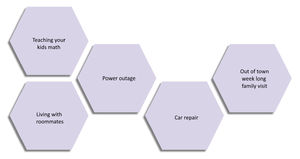
Data-set Idea - Everyday activities sourced from participants of workshops
Data-set status
| Idea
|
Draft partial
|
Draft complete
|
Published
|
Used
|
| X |
X |
|
|
|
Data-set description
| Main label
|
Every day activity
|
| Category
|
(Not used) could be about family, environment, materials, work, entertainment ...?
|
| Sub-category
|
(Not used)
|
| Picture
|
Optional. A vectorial icon or stylized picture that visually describes the item 150x150px size, with transparent background
|
DATA-SET - Everyday activities sourced from participants
| Main label
|
Category
|
Sub-category
|
Picture
|
| Teaching your kids math
|
- |
- |
-
|
| Adopting a child
|
- |
- |
-
|
| Choosing a lifetime career
|
- |
- |
-
|
| finding a life partner
|
- |
- |
-
|
| Writing a book
|
- |
- |
-
|
| Power outage
|
- |
- |
-
|
| Living with roommates
|
- |
- |
-
|
| Learning new language
|
- |
- |
-
|
| Moving to a new country
|
- |
- |
-
|
| Planning a retirement
|
- |
- |
-
|
| Getting into medical school
|
- |
- |
-
|
| Planning your work schedule
|
- |
- |
-
|
| Teaching your kids math
|
- |
- |
-
|
| Changing a flat tire
|
- |
- |
-
|
| Curing cancer
|
- |
- |
-
|
| Mowing a law
|
- |
- |
-
|
| Investing in stock market
|
- |
- |
-
|
| New gutters on the house
|
- |
- |
-
|
| Children in school - bad company
|
- |
- |
-
|
| Children in school - no interest in learning
|
- |
- |
-
|
| Buying a house
|
- |
- |
-
|
| Death of a family member
|
- |
- |
-
|
| Changing brake pads on a car
|
- |
- |
-
|
| Getting your family to exercise
|
- |
- |
-
|
| Car repair
|
- |
- |
-
|
| Backyard work
|
- |
- |
-
|
| Serious health care crisis
|
- |
- |
-
|
| Driving home after a major earthquake
|
- |
- |
-
|
| Divorce in family
|
- |
- |
-
|
| Mountain hiking trip
|
- |
- |
-
|
| Out of town family visiting for a week
|
- |
- |
-
|
| Car winterization
|
- |
- |
-
|
| Creation of reading habits in children
|
- |
- |
-
|
| Heath care provider selection
|
- |
- |
-
|
| Creation of learning habits
|
- |
- |
-
|
| Increasing school engagement
|
- |
- |
-
|
| Winter wood supply
|
- |
- |
-
|
| Careless driving habits
|
- |
- |
-
|
| Family housekeeping duties
|
- |
- |
-
|
| Overweight remedy
|
- |
- |
-
|
| Tonight's dinner preparation
|
- |
- |
-
|
| Children trouble in school
|
- |
- |
-
|
| Nurse training
|
- |
- |
-
|
| Addressing global warming
|
- |
- |
-
|
| High blood pressure treatment
|
- |
- |
-
|
| Diabetes treatment
|
- |
- |
-
|
| Next reading (book) selection
|
- |
- |
-
|
| Planning vacations
|
- |
- |
-
|
| Movie selection
|
- |
- |
-
|
| Work estimation
|
- |
- |
-
|
| Aging parent care
|
- |
- |
-
|
| Gift shopping
|
- |
- |
-
|
| Buying of a new car
|
- |
- |
-
|
| Professional career building
|
- |
- |
-
|
Art work
Data-set status
| Idea
|
Draft partial
|
Draft complete
|
Published
|
Used
|
| X |
X |
|
|
|
Data-set description
| Main label
|
Art work
|
| Domain
|
To which domain(s) is the item relevant?
|
| Description
|
What is the relevance to the domain(s)?
|
| Picture
|
Mandatory. A vectorial icon or stylized picture that visually describes the item 100x100px size, with transparent background
|
Download the pictures with a square background for printing.
Download the pictures with a hexagonal background for printing.
DATA-SET - Art work
| Main label
|
Domain
|
Description
|
Picture
|
| EYE SEE YOU - Perspective Playground, photokina 2018 - "Super Labyrinth“ by Morag Myerscough and Luke Morgan - Picture by Alexander Schimmeck on Unsplash
|
Ordered |
The result is predictable. The piece can be reproduced by following instructions. |
|
| Bristol Street Art - Picture by Annie Spratt on Unsplash
|
Chaos |
The result seems random. As it is street art, the passage of time other human additional intervention also affects it. |
|
| Solva (Fishing Village in Pembrokeshire), 1936 by Frances Hodgkins (d. 1947) - Picture by Birmingham Museums Trust on Unslplash
|
Complex |
The painting depicts an existing landscape. In order to create it, there is a part related to planning the outline of the piece, and then improvising, exploring how to represent (and not copy) reality. |
|
| Morgan-le-Fay, 1864 Artist: Frederick Sandys - Picture by Birmingham Museums Trust Unsplash
|
Orderd/Complex |
Some part relate to an accurate representation of reality and others call upon the imagination to interpret the abstract features to something specific. |
|
| In Summer, Kiowa, 1898 - Picture by Boston Public Library on Unsplash
|
Orderd/Complex |
Some part relate to an accurate representation of reality. Others call upon the imagination to interpret the abstract features to something specific. |
|
| Birch trees at Spot Pond, 1931 [Original picture] - Picture by Boston Public Library on Unsplash
|
Orderd |
The representation is trying to get closer to what we would see in reality. |
|
| Tribes and Castes of India. 'Sannyasi’ a Saiva mendicant. Circa 1825 - Picture by British Library on Unsplash
|
Orderd/Complex |
Some part relate to an accurate representation of reality. Others call upon the imagination to interpret the abstract features to something specific. |
|
| A portrait of a dancing girl in a white sari with a red border, seated on a western style sofa on a terrace. Circa 1780 - Picture by British Library on Unsplash
|
Orderd/Complex |
Some part relate to an accurate representation of reality. Others call upon the imagination to interpret the abstract features to something specific. |
|
| Urban black and white line graffiti, Los Angeles (USA) - Picture by Content Pixie on Unsplash
|
Complex |
We are able to recognize faces thanks to our cognitive abilities allowing us to give meaning to abstraction. The process of creating the piece called upon some planning and some improvisation. |
|
| Nina Chanel Abnex Studio, INC. 2018-0000 - Picture by Cris Dinoto on Unsplash
|
Ordered |
The result is predictable and could be reproduced by following instructions. |
|
| Rudolph II as Vertumnus by Giuseppe Arcimboldi (1590-1591) - Picture by Europeana on Unsplash
|
Ordered |
The representation is trying to get closer to what we would see in reality. |
|
| A ball of energy with electricity beaming all over the place - Picture by Halgatewood on Unsplash
|
Complex |
The process of creating the piece called upon some planning and some improvisation. |
|
| Layers of wheat-pasted posters on a wall, Brooklyn, NYC, USA - Picture by Jazmin Quaynor on Unsplash
|
Chaos |
The result seems random. As it is street art, the passage of time and other human additional intervention also affects it. |
|
| Over the City Nocturnal - Picture by Jr Korpa on Unsplash
|
Chaos |
The result seems random and couldn't be reproduced. |
|
| Dreamy Tree 2 - Picture by Jr Korpa on Unsplash
|
Complex |
The process of creating the piece called upon some planning and some improvisation. |
|
| Bicycling. Aquelle print by L. Prang & Co. of a painting by Henry "Hy" Sandham, c1887. Graphics Art Collection. Library of Congress Prints & Photographs Division, Original - Picture by Library of Congress on Unsplash
|
Complex |
The process of creating the piece called upon some planning and some improvisation around how to represent reality whithout trying to copy it accurately. |
|
| Yayoi asukayama hanami. (Translated title: Third Lunar Month, Blossom Viewing at Asuka Hill). Woodcut print by Kitao Shigemasa, (1772 - 1776]). Library of Congress Prints & Photographs Division. Original - Picture by Library of Congress on Unsplash
|
Complex |
The process of creating the piece called upon some planning and some improvisation around how to represent reality whithout trying to copy it accurately. |
|
| Learn to swim campaign. Classes for all ages forming in all pools. Poster from the Federal Art Project, (1936-1940). Library of Congress Prints & Photographs Division, Original - Picture of Library of Congress on Unsplash
|
Ordered |
The result is predictible and can be reproduced by following instructions. |
|
| The National Parks Preserve Wild Life. Poster from the NYC: Works Progress Administration, Federal Art Project, (1936-1939]. Library of Congress Prints & Photographs Division, Original - Picture by Library of Congress on Unsplash
|
Complex |
The process of creating the piece called upon some planning and some improvisation around how to represent reality whithout trying to copy it accurately. |
|
| Untitled - Picture by Max Kleinen on Unsplash
|
Chaos |
The result seems random and couldn't be reproduced. |
|
| First. First of Many, I guess?, Unknown (2015) Montreal, Canada - Picture by Mr Tt on Unsplash
|
Ordered/Complex |
The process of creating the piece called upon some stricter planning and some improvisation around how will come next. |
|
| Untitled - Picture by Oleg Laptev on Unsplash
|
Ordered |
The result is predictible and can be reproduced by following instructions. |
|
| Brick wall painting of faces - Picture by Oliver Cole on Unsplash
|
Complex |
We are able to recognize faces thanks to our cognitive abilities allowing us to give meaning to abstraction. The process of creating the piece called upon some planning and some improvisation. |
|
| Untitled - Picture by Pawel Czerwinski on Unsplash
|
Chaos |
The result seems random and couldn't be reproduced. |
|
| Untitled - Picture by Dids on Pexels
|
Chaos |
The result seems random and couldn't be reproduced. |
|
| Untitled - Picture by Eberhard Grossgasteiger on Pexels
|
Complex |
We are able to recognize the objects thanks to our cognitive abilities allowing us to give meaning to abstraction. The process of creating the piece called upon some planning and some improvisation around how to provide an impression of what it is whithout copying it accurately. |
|
| Untitled - Picture by Karolina Grabowska on Pexels
|
Chaos |
The result seems random and couldn't be reproduced. |
|
| Untitled - Picture by Luis Quintero on Pexels
|
Chaos |
The result seems random and couldn't be reproduced. |
|
| Untitled - Picture by Nick Collins on Pexels
|
Chaos |
The result seems random and couldn't be reproduced. |
|
| Untitled - Picture by Steve Johnson on Pexels
|
Chaos |
The result seems random and couldn't be reproduced. |
|
| Untitled - Picture by Steve Johnson on Unsplash
|
Chaos |
The result seems random and couldn't be reproduced. |
|
| Rapid Ice Movement on Russian islands in the Arctic Ocean - Picture by Usgs on Unsplash
|
Chaos |
The result seems random and couldn't be reproduced. |
|








